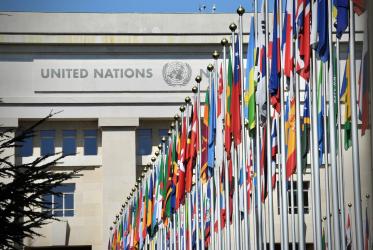The first-ever International Congress on Discrimination Based on Work and Descent was held in New York on 21-23 September alongside the UN Climate Summit. Over 100 participants including 10 parliamentarians from different parts of the world gathered, strategizing on forming a global network.
The World Council of Churches (WCC) was invited to participate to understand the struggle for dignity and rights in these communities. Discriminated against based on their work and descent, these communities are home to some of the most excluded, segregated, and marginalized groups at the global and local levels. Approximately 260 million people worldwide come under this framework.
Participants looked at particular types of hierarchical-hereditary based structures among societies across the globe, which generate the same set of human rights violations and barriers limiting socio-economic development. Unlike racism and xenophobia, the structural violence of this form of discrimination does not rest on the white/non-white binary and on inferiority based on visible or ostensibly ‘biological’ differences given the legacy of colonialism.
The Asia Dalit Rights Forum along with the National Campaign for Dalit Human Rights, among others, took the lead in organising this historic event in collaboration with the Africa Network on Slavery and Discrimination Based on Work and Descent, TrustAfrica, European Roma Grassroots Organisations Network, The Inclusivity Project and the Boston Study Group.
Dalits are a community formerly known as the “untouchables” in south Asia and are found at the bottom of the social hierarchy determined by caste based segregation, primarily in Hindu religion but affects all religions in the region.
Dr Rita Izsak-Ndiaye, who herself represents the Roma community, spoke in support of the global network. She drew attention to her report presented at the Human Rights Council in 2016 on discrimination based on caste and analogous systems of inherited status globally. She also highlighted the connection between caste and stigma and discrimination related to the human right to water and sanitation. She further emphasised that the word "descent" is mainly used in the context of Afro-descendants today and more awareness-raising is needed to educate people on the wider concept of discrimination based on work and descent. “Therefore, a collective networking of communities affected by discrimination due to work and descent provides the much needed momentum to unite forces and advocate for equality in rights and dignity,” she said.
Kumi Naidoo, secretary general, Amnesty International, said that the “plight of the communities discriminated based on work and descent is a matter of international shame and an utter disgrace to humanity. Amnesty is apologetic that we have taken this long to address the issue.”
Representing the WCC, Dinesh Suna, coordinator of the Ecumenical Water Network, who is also a Dalit himself, congratulated the organisers. He underlined the WCC’s commitment to justice and peace. “This year the WCC is focusing on racism and xenophobia within the framework of the Pilgrimage of Justice and Peace,” he said.
He further reminded the participants the role of WCC in the past decades in addressing the issues of racism and in particular the concern of Dalits in India during and after the World Conference against Racism in Durban in 2001. “The WCC welcomes the formation of this global network. The WCC is committed to showing its solidarity in the struggle for justice and dignity”.
A declaration was issued by the participants forming a global network called “Global Forum on Discrimination on Work and Descent” to work against casteism, slavery and antigypsyism.
Learn more about the WCC work on Solidarity with Dalits for Justice and Dignity







